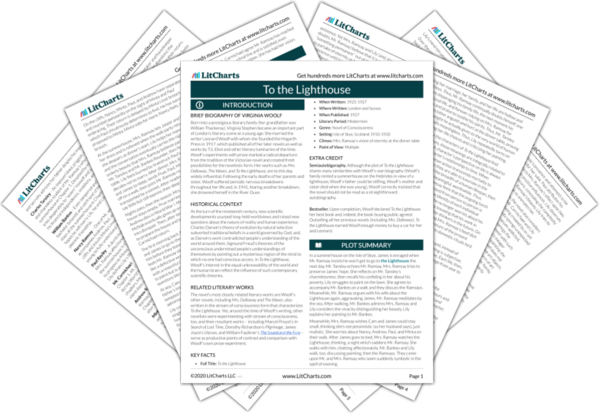Summary
Analysis
Mrs. Ramsay considers Mr. Carmichael who has been coming to the summerhouse every summer for years and still doesn’t trust her. She blames his wariness on his cruel ex-wife. Still, his behavior hurts her, and “her own beauty [becomes] present to her” as she reflects that she is usually liked so well by everyone, that all kinds of people admire her and seek her out for her consoling, sympathetic spirit. Yet she recognizes, too, that she is not only hurt by Mr. Carmichael’s wariness of her, she is troubled by what that hurt suggests: that her desire to be warm and giving towards people is only vanity, and more a desire to be wanted than a desire to help. Then, telling herself that she is, after all, no longer such a beauty, she returns to focusing on the story of the Fisherman and his Wife that she is reading to James.
As usual, Mrs. Ramsay’s protectiveness towards men makes her blame Mr. Carmichael’s failed marriage on his wife. Mrs. Ramsay likes to think of herself as a sympathetic do-gooder admired for her warm generosity, but Mr. Carmichael’s wariness towards her challenges that self-image. It makes her wonder whether her life’s aspiration to be kind and helpful is in fact a selfish hunger for praise (which would then bear a similarity to Mr. Ramsay).
Themes
Quiz
Test Yourself
Mr. Ramsay passes the window just as Mrs. Ramsay reads about the Fisherman reluctantly going out to sea, thinking ‘it is not right’ and yet going. Mr. Ramsay nods and continues on the lawn, contemplating, after remembering a newspaper article on Shakespeare’s house, whether Shakespeare and, by extension, all great men are necessary to civilization. Disgusted by the possibility that “the greatest good” depends upon “a slave class,” Mr. Ramsay resolves to “argue that the world exists for the average human being,” that art is a superfluous decoration incapable of conveying life’s essence. He thinks how he will have to collect his thoughts in time to lecture at Cardiff next month.
The story Mrs. Ramsay is reading James uncannily mirrors Mr. Ramsay, who is walking with mixed feelings towards the ocean. Though Mr. Ramsay often seems to want to be a great man himself, he is much more democratic in his thinking, planning to argue for the good of the common man rather than for that of the refined genius. In Mr. Ramsay’s mind, art is nothing but a kind of pretty little doily placed on top of life without actually participating in life itself.
Themes
Quiz
Test Yourself
He walks to the edge of the lawn and looks out at the sea. The perspective zooms out to observe that it was Mr. Ramsay’s destiny, “whether he wished it or not, to…stand…alone…facing the dark of human ignorance, how we know nothing and the sea eats away the ground we stand on.” There, he retains only his intensity of mind, all fame and personality stripped from him. He is likened to the marking “stake driven into the bed of a channel” which onlookers observe from their own distant positions of safety with gratitude “for the duty it has taken upon itself” of marking.
Despite Mr. Ramsay’s self-doubt and neediness for praise, the text suggests that the real meaning of his life lies in his ability to totally disconnect from his own ego and personality and become a pillar of strength facing the sea, whose dark chaos symbolizes the terrors of human ignorance and mortality.
Themes
Quiz
Test Yourself
Murmuring that “the father of eight children has no choice—,” Mr. Ramsay turns back to look at Mrs. Ramsay and James. He admits he is “for the most part happy,” in his family, in the prospect of talking “’some nonsense’” in Cardiff. The perspective zooms out to note the disguise of the phrase ‘some nonsense,’ in which Mr. Ramsay pretends not to like the thing that actually makes him most happy. Mr. Bankes and Lily consider such falsifications “rather pitiable and distasteful,” thinking how Mr. Ramsay manages to be simultaneously “venerable and laughable.” Mr. Ramsay walks towards the house stopping now and then to turn and stare into the sea, then turn back away.
Even as Mr. Ramsay is capable of depersonalizing himself and facing the dark mysteries of human existence, he is also a husband and family man who takes pleasure in domestic life. Thus, he looks back and forth from the sea to the family lawn. Mr. Ramsay’s instinct to pretend that his lecturing—which fills him with joy—is nothing but ‘nonsense’ speaks to his wish not to seem so hungry for others’ admiration. Lily finds this anxiety pathetic, but notes that other parts of Mr. Ramsay are far from pathetic, are “venerable.”
Themes
Quiz
Test Yourself
Get the entire To the Lighthouse LitChart as a printable PDF.













